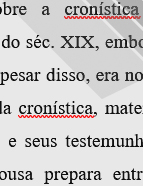

................................
The bibliography on the text that came to be known as the Crónica de 1419 [Chronicle of 1419] would rapidly grow, giving rise to a voluminous and important wealth of information, focusing, however, on a relatively common theme: were they the "lost" chronicles written by Fernão Lopes? This question fuelled much of the research of the following years, summarised by Magalhães Basto himself a few years later (Estudos. Cronistas e Crónicas Antigas [Studies. Chroniclers and Ancient Chronicles...], Coimbra, 1959, pp. 509-548), and after him Giuliano Macchi (1963). In fact, the attempt to determine the authorship of this chronicle and its identification as the first part of Fernão Lopes's Crónicas dos reis de Portugal [Chronicles of the kings of Portugal] dominated researchers' concerns throughout the 1940s and the 1950s, without the accomplishment of comprehensive, in-depth studies on the text in question. Only in 2010, with his doctoral thesis, (A Crónica de Portugal de 1419...,[The Chronicle of 1419 Portugal] Lisbon, 2013) would Filipe Alves Moreira achieve what had been promised by various researchers, but had always been postponed.
At the same time, various publications continued to engage efforts in recovering the medieval past. Damião Peres, the author of a História de Portugal with his well-known doctrinal stance stood out in this period for the nationalist and "patriotic" character imprinted on his introductory remarks to the chronicles he edited. This trait was particularly discernible in his introduction to the Crónica de D. Pedro [Chronicle of D. Pedro] (1932), however his transcription has already been noted for its accuracy (Amado, "The study of literary texts", 2011, p. 92), as has the importance of the list of document sources he provided, which facilitated access to the construction of the narrative. Some years later, Peter Russell, a historian from Oxford University, also worked on the sources of that chronicler in a short but important study (As fontes de Fernão Lopes [The sources of Fernão Lopes], 1941). This work assisted the then young scholar in finding the Portuguese sources at the Torre do Tombo, which he later published in the book The English Intervention in Spain and Portugal in the time of Edward III and Richard II (1955).
